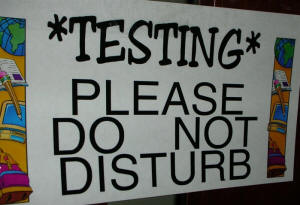Educators push back against testing requirements
 Send a link to a friend
Send a link to a friend
[April 30, 2022]
By PETER HANCOCK
Capitol News Illinois
phancock@capitolnewsillinois.com
 SPRINGFIELD – Teachers and other education
professionals are urging the Illinois State Board of Education to reduce
the amount of time students spend on standardized tests each year and to
adopt a new testing system that produces more useful information to help
teachers improve their instruction. SPRINGFIELD – Teachers and other education
professionals are urging the Illinois State Board of Education to reduce
the amount of time students spend on standardized tests each year and to
adopt a new testing system that produces more useful information to help
teachers improve their instruction.
“One thing that we're saying and that our members are saying is that we
have a testing regime that has gone too far, and is not helping children
learn,” Illinois Federation of Teachers president Dan Montgomery said
during a virtual news conference Friday.
Under state and federal law, all students in grades 3-8 are tested each
year in English language arts and math. They are also tested in science
in grades 5, 8 and 11. In Illinois, those tests are known as the
Illinois Assessment of Readiness, or IAR, and are taken by students in
the spring.
Nationwide testing mandates are a product of the 2002 federal law known
as the No Child Left Behind Act which uses them to hold teachers,
schools and districts accountable for meeting state educational
standards.

Recently, though, the State Board of Education has considered
overhauling its testing system and at one point proposed replacing the
single year-end test with three smaller tests that would be given in the
fall, winter and spring. The plan also would have given districts the
option of testing children in kindergarten through grade 2.
Amid pushback from teachers unions and others, however, ISBE backed away
from that plan last year and instead commissioned a survey from the
national Center for Assessment to get feedback from teachers,
administrators, parents, students and others about ways to improve the
state’s testing system.
“We don't want to just decrease the amount of time of the
end-of-the-year test, we want to decrease the amount of testing period,”
said Monique Redeaux-Smith, IFT’s director of union professional issues.
The results of that survey were presented to the board April 20. Among
the key findings was that many people found the current testing system
doesn’t provide much instructionally useful information because the
tests are administered in the spring and results aren’t released until
the next fall after students have already advanced to another grade.
Many respondents also said too much time is devoted to preparing for and
administering tests, taking away from actual classroom instruction.
Many people surveyed also suggested the state could provide more
resources to help local districts give interim tests at different times
of the year – tests that would be completely separate from the
accountability tests given in the spring – to help teachers tailor their
instruction to meet their students’ immediate needs.
[to top of second column]
|

Teachers and other education advocates are urging the
Illinois State Board of Education to go back to square one in its
attempt to overhaul the system of standardized testing for students.
(Credit: Morguefile.com)

Finally, the report recommended that ISBE take its time and move
deliberately before making any major changes to the testing system.
“There is high agreement about the need to improve state assessment, but
less consensus about what improvement consists of,” the report stated.
“ISBE can play a central role in providing leadership, building up
trust, and developing plans that balance moving forward with maintaining
needed quality.”
The push toward standardized testing as a way of holding schools
accountable grew out of a movement that began decades earlier, known as
outcomes-based education – the idea that schools should be graded on the
basis of how much students learn rather than the resources that go into
them.
That movement got a big boost during the Reagan administration with the
publication of a 1983 report, A Nation at Risk, which painted a highly
critical picture of the failures of American schools, calling the entire
public education system “mediocre” and warning that it was quickly being
surpassed by those of other nations.
But the emphasis on testing has long met resistance from many people
within education, particularly teachers unions who have complained that
it is unfair – especially to minority and low-income students who are
more likely to attend under-resourced schools – and that it detracts
from classroom education.
“This is a racist relic of the past,” state Sen. Cristina Pacione-Zayas,
D-Chicago, said during the news conference. “Assessments have served to
keep groups out of institutions, and we know that the value, the
validity in our education system of using these assessments are highly
questionable.”

Paul Zavitkovsky, a former teacher and principal who now works at the
Center for Urban Education Leadership, said there are testing systems
available that would produce more useful information for teachers, but
many of them don’t report the results in any meaningful way.
“It looks like what the job of teaching is, is teaching a larger number
of discrete skills faster and more effectively,” he said. “And that
actually ends up reinforcing exactly the kind of teaching and learning
that creates a lot of the opportunity gaps that we actually see out
there.”
Capitol News Illinois is a nonprofit, nonpartisan news
service covering state government and distributed to more than 400
newspapers statewide. It is funded primarily by the Illinois Press
Foundation and the Robert R. McCormick Foundation. |